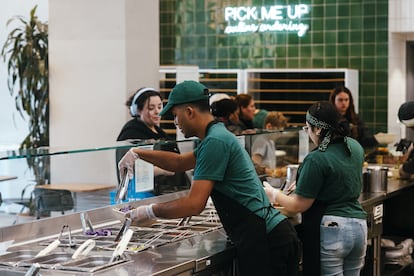Hispanic-owned businesses in the US employ 3.5 million people. How many would there be if the playing field was level?
Financial obstacles and fewer opportunities limit the development of numerous projects set up by Hispanic entrepreneurs. This has a negative impact on the national economy

They’re not on the most expensive avenues, nor are they the tallest buildings in town. Yet, they’re crucial to job-creation and the American economy. Beyond the multinationals, the S&P 500 companies and the large chains, there’s an important network of small and medium-sized companies and start-ups that keep the wheels of the economy turning. At the origin of many of these businesses are Latinos, who are currently creating companies at a higher rate than other communities. However, inequality remains: while Latinos make up 20% of the U.S. population, they own only 6.9% of all businesses.
According to figures from the Latino Entrepreneurship Initiative at Stanford University, there are 4.7 million Latino businesses of different sizes in the United States, which contribute $800 billion to the economy annually. 463,000 of these businesses employ over 3.5 million people. It’s an important number, but taking into account that there are some 160 million workers throughout the country, the story of Latino entrepreneurship in the U.S. is just beginning.
Today, the economic contribution of these businesses could — and should — be far greater, if it weren’t for their limited access to financing, the vulnerability they have with respect to the liquidity in their coffers, as well as the fewer investment opportunities that are available to them.
Mari Borrero has experienced this inequality firsthand. She’s the CEO of a company that she founded with her husband in 2017: American Abatement & Demo (AAD). The demolition company, based in the state of Washington, employs formerly incarcerated people and has sales of $3 million and a team of 14 employees. But things haven’t been easy. Before becoming an entrepreneur, Borrero ran a hospice and had been a teacher. Hence, upon starting her new enterprise, she had to learn how to navigate an unfamiliar system and build relationships with banks and credit unions. “It’s a giant puzzle that you have to solve, all while managing a business,” she sighs, while holding her pink construction helmet.
Borrero says that she feels like she’s trapped on a hamster wheel: spinning around while looking for financing. “First, they tell you that your credit score isn’t high enough. Then, when you finally [have a good score] and apply for a loan, they tell you that you haven’t been in business for enough years. The goal always gets further and further away.”
A few months ago, her company was recognized as a star client of the Washington Small Business Development Center. Barrero recounts a scene that has stuck with her: “At the celebration that took place, there were many [bankers who] denied us financing. They told us they were sorry they couldn’t help us, while congratulating us on the recognition. But how does that help me?”
Despite the challenges, these companies highlight the vital role of Latinos in shaping a more inclusive American business landscape. Barbara Gómez Aguinaga — associate director of the Stanford Latino Entrepreneurship Initiative (SLEI) — explains that 52% of job creators within the Hispanic business community are immigrants. In the case of white businesses, only 7% of employers have immigrated to the U.S. from other countries. This evidence adds to a series of studies — including ones commissioned by the Congressional Budget Office (CBO) — that show the positive contribution of immigration to the overall U.S. economy.
Opening a business requires a drive that’s similar to the one required when deciding to cross a border and starting from scratch in an unknown place. And, once in the U.S. business sector, the obstacles multiply and many ventures fall by the wayside, despite the evidence that shows how greater equality would benefit the country as a whole. Achieving parity “isn’t only crucial to empowering Latino businesses, but also to strengthening the U.S. economy and the country’s workforce,” the Stanford report notes.
Elián Savodivker — the director of Engagement for the Latino Business Action Network (LBAN) — explains that, if it were not for these difficulties, the opportunities for growth would be far greater. “Without these problems, companies could reach their potential. It’s a $3 trillion opportunity.” Her experience indicates that this business community is hiring at a higher rate and offering employees better benefits. “Something we’ve seen is that Latinos tend to come from difficult situations, there’s a sense of family that’s really strong and very similar to the one they create with employees.”
What they’ve observed at Stanford is that, when a loan is requested for an amount of less than $50,000, Hispanic entrepreneurs have a higher approval rate than other groups. However, when it comes to a larger sum, the situation is reversed. The reason is because, when it comes to smaller loans, the decision is made by a systematized process. But when more money is involved, the human factor intervenes. This is when you have to have the conversation at the bank and that’s when the chances of success are reduced.
This isn’t a minor problem. Access to financing is important to survive extraordinary moments — such as the pandemic — but also to boost growth, for the functioning of the payroll system, the expansion of companies and the creation of more jobs. It also allows entrepreneurs to take advantage of new opportunities, such as the one that was presented to AAD, Borrero’s company, in 2023.
In May of that year, the Olympic National Park Visitor Center in the state of Washington burned down while undergoing renovation work. To be able to rebuild it and open it in time for the ski season, they first had to demolish it. The budget was $815,000 and the deadline was 30 days. The National Park Service contacted Borrero and she accepted. The problem? Her firm had to demonstrate sufficient liquidity to be able to get the contract and undertake the work, while also taking into account that the payment for the job would take months to be processed.
Unable to get a bridge loan from a financial institution, Borrero had no choice but to go to her parents. At this point in her conversation with EL PAÍS, the businesswoman becomes emotional and fights back tears. She says that she knows that her parents are proud of her and her family, but she recognizes that they have their own needs. “I knew they would help me, but it shouldn’t be like this. It shouldn’t come to this, because there’s a lot of money out there, people are making a lot of money. It’s very frustrating that it’s so hard for small businesses, that they continue to complicate conditions for us again and again.”
The director of the LBAN emphasizes that financial institutions still have to learn that investing in Latino entrepreneurs is far from being a risky opportunity. Rather, investing in them would be a demonstration of a “risk-averse attitude.” “Latinos know that it’s not the business” that’s a problem, she says. “It’s the bias. And that’s what has to change, because when you see the numbers, you cannot defend that bias.”
On the bright side, there are some trends that can help with the current imbalance. The greater presence of Latinos in more financial institutions — individuals who know the difficulties personally — will contribute to expanding opportunities in the long-run.
Savodivker adds that, today, Latino entrepreneurs are doing a lot with a little. In the end, everything is a matter of numbers: “Change will come, because there’s a lot of money that’s not being used — financial solutions aren’t provided to this community.”
Sign up for our weekly newsletter to get more English-language news coverage from EL PAÍS USA Edition
Tu suscripción se está usando en otro dispositivo
¿Quieres añadir otro usuario a tu suscripción?
Si continúas leyendo en este dispositivo, no se podrá leer en el otro.
FlechaTu suscripción se está usando en otro dispositivo y solo puedes acceder a EL PAÍS desde un dispositivo a la vez.
Si quieres compartir tu cuenta, cambia tu suscripción a la modalidad Premium, así podrás añadir otro usuario. Cada uno accederá con su propia cuenta de email, lo que os permitirá personalizar vuestra experiencia en EL PAÍS.
¿Tienes una suscripción de empresa? Accede aquí para contratar más cuentas.
En el caso de no saber quién está usando tu cuenta, te recomendamos cambiar tu contraseña aquí.
Si decides continuar compartiendo tu cuenta, este mensaje se mostrará en tu dispositivo y en el de la otra persona que está usando tu cuenta de forma indefinida, afectando a tu experiencia de lectura. Puedes consultar aquí los términos y condiciones de la suscripción digital.









































